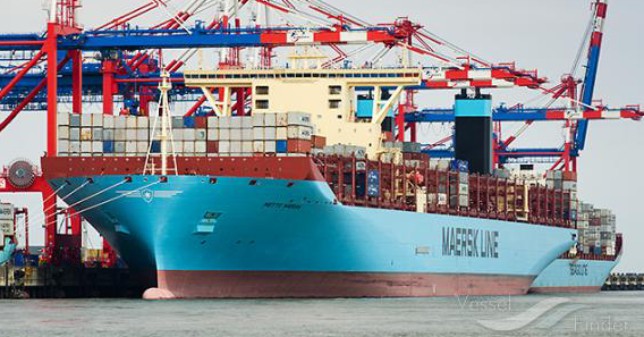In partnership with Dutch multinationals, Maersk will test the second-generation biofuels on the 18,000-TEU Mette Maersk, which will sail 25,000 nautical miles.
A.P. Møller – Maersk has partnered with members of the Dutch Sustainable Growth Coalition (DSGC) to conduct a biofuel test on the largest scale the shipping industry has seen.
The world’s largest shipping company agreed to sail the Mette Maersk, an 18,000-TEU containership, 25,000 nautical miles round-trip from Rotterdam to Shanghai using a blend of up to 20 percent sustainable second-generation biofuels.
“This string was chosen by the Dutch Sustainability Growth Coalition, as this is a primary trade route for many of the members,” said David Samad, who is a senior member of Maersk’s technical innovation group and the project lead on the initiative, Tuesday in an email. “It is also one of our longest and largest commercial strings.”
The voyage, which will take place between March and June, is expected to save 1.5 million kilograms of CO2 and 20,000 kilograms of sulfur. The CO2 savings on the pilot journey alone equals the annual CO2 emitted by more than 200 households in a year or 12 million kilometers traveled in an average car, which is 300 times around the world, Maersk said in a statement.
The DSGC members include Dutch multinationals FrieslandCampina, Heineken, Philips, DSM, Shell and Unilever. Shell acted as the supplier of the fuel, which is produced from used cooking oil. The costs will be “significantly” higher than a trip using normal marine fuel, Søren Toft, Maersk’s COO, said according to Bloomberg.
Samad said the bunkering process was “fairly straightforward, but required minimal contamination from other fuel products.” The main changes for the pilot were related to risk mitigation, he said.
“We created new monitoring schedules for critical components and procured spare parts in the event of any issues,” he said. “Vessel modifications were not required, but this trial will help validate that.”
Shipping accounts for 90 percent of transported goods and 3 percent of total global CO2 emissions, which could rise to 15 percent by 2050 if left unchecked. Although sustainable biofuels are one option to decarbonize ocean shipping, breakthroughs in fuel and technical development and investment into commercial supply chains “are needed to achieve significant emissions reductions,” Maersk said in a statement.
“Biofuels are just one potential solution, either as a drop-in solution in the short term or a piece of the puzzle as we approach 2050 and beyond,” Samad said. “We are working closely with partners across various fuel streams and verticals, including e-fuels such as ammonia and methanol, and will continue to develop and test potential solutions applicable to ocean shipping. Each fuel has different paths to technical validation and commercialization, many of which will require support from regulations and equipment providers.”
Maersk’s large-scale test was announced one day before French line CMA CGM completed its first bunkering of sustainable biofuel Saturday in Rotterdam.
The 5,095-TEU CMA CGM White Shark took the oil supplied by GoodFuels in a project announced earlier this month also involving the port and IKEA. The oil is derived from forest residue and waste cooking oil products, and it is expected to deliver 80 percent to 90 percent CO2 emissions and eliminate sulfur oxide emissions.











